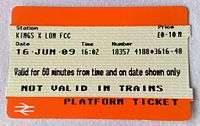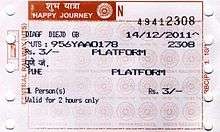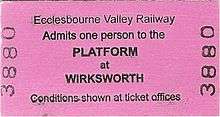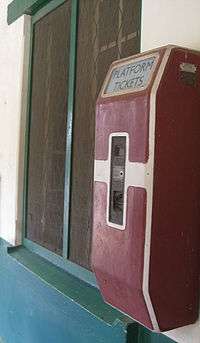Platform ticket

A platform ticket is a type of rail ticket issued by some railway systems, permitting the bearer to access the platforms of a railway station, but not to board and use any train services. It allows people to walk with their friends and loved ones all the way to the passenger car at stations where the general public is not admitted to platforms. Railfans can also purchase platform tickets and enjoy their trainspotting hobbies.[1] They vary in type: some may only allow limited access and a sharply limited time of usage, while others may have totally free access to enter the platform area. During peak usage hours or rush hours, the platforms may only be available for passengers who intend to travel.
History
Platform tickets emerged in the 19th century. At that time the doors to passenger coaches opened directly onto the platform and were not connected by an internal corridor, as they are today. In order to inspect tickets, conductors had to move along the outside of the train while it was in motion. Although trains moved much slower than today, there were numerous accidents. Therefore, railway operators began to check the tickets on the platform before passengers boarded the train. Passing these checkpoints required either a ticket for travel or the platform ticket, which was only valid for access to the platform. After railcars were changed, people and conductors could move from carriage to carriage so checking the tickets outside the train was no longer necessary. Most railway transport systems abolished this in the second half of the 20th century. As soon as there were no more checks, the platform ticket was unnecessary and generally be abandoned. However, as there are now automated ticket barriers, railfans and trainspotters buy these tickets to get past the barriers and onto the platform.[2]
Usage by country
Germany
In Germany the Royal Prussian Railway was the first carrier to introduce ticket checks outside the trains in 1893. Other railways in Germany soon followed. Platform checks and tickets were done away with in East Germany in 1970 and in West Germany in 1974. The only exception is the local train network (S-Bahn) in Hamburg, where platform tickets must still be bought to access the platforms without a travel ticket.
India

A platform ticket in India costs ₹ 10 (increased in 2015 Railway Budget) and is valid for one person only. It allows the person to access the platforms for a time period of two hours. A person having a railway ticket for a train on the same day is not required to have a platform ticket. The platform ticket can be bought on any ticket reservation booth in the railway station. If caught without a platform ticket if the person is not a traveller, he/she may be fined anywhere from ₹ 250 to 270.
Japan
Japan Railways Group (JR Group) companies sell platform tickets (入場券 nyūjōken) priced between 120 yen and 160 yen at all staffed stations and platform passes (定期入場券 teiki nyūjōken), which allow unlimited access to the platform area for one month, priced between 3,780 yen and 4,890 yen at limited stations. They do not allow holders to board trains. All staffed stations of JR East, JR Central and JR West, and stations of JR Hokkaido with automatic ticket gates limit the validity of the ticket to two hours from issuance; an additional fee is charged if the ticket holder exits the ticket gate after the two-hour period expires.[3]
United Kingdom

Platform tickets were in common use on the mainline network until the mid 20th century, and the majority of ticket offices are still equipped to issue them. The use of automated ticket barriers at stations has resulted in a renewed demand for platform tickets. Railfans, in particular, are told that they may require a platform ticket for access to platforms,[4] but some individuals have expressed difficulty in obtaining them.[5] These tickets cost 10p typically [6] and are only valid for one hour.
Some heritage railways and museums issue platform tickets for admittance or as souvenirs.
United States
While not a platform ticket per se, Bay Area Rapid Transit charges a specialty excursion fare for entering and exiting the system within three hours at the same station.
References
- ↑ http://www.networkrail.co.uk/aspx/777.aspx
- ↑ http://www.networkrail.co.uk/aspx/777.aspx
- ↑ JR East: Information on tickets (Japanese)
- ↑ "Guidelines for Rail Enthusiasts". Association of Train Operating Companies. Retrieved 2009-06-19.
- ↑ "Platform Tickets - Discussion". RailUK Forums. Retrieved 2009-06-19.
- ↑ See Above image
